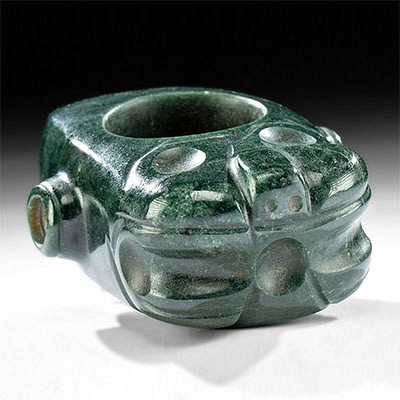2nd C. Gandharan Stone Relief Panel w/ Buddha
Lot 62
About Seller
Artemis Gallery
686 S Taylor Ave, Ste 106
Louisville, CO 80027
United States
Selling antiquities, ancient and ethnographic art online since 1993, Artemis Gallery specializes in Classical Antiquities (Egyptian, Greek, Roman, Near Eastern), Asian, Pre-Columbian, African / Tribal / Oceanographic art. Our extensive inventory includes pottery, stone, metal, wood, glass and textil...Read more
Categories
Estimate:
$1,200 - $1,800
Absentee vs Live bid
Two ways to bid:
- Leave a max absentee bid and the platform will bid on your behalf up to your maximum bid during the live auction.
- Bid live during the auction and your bids will be submitted real-time to the auctioneer.
Bid Increments
| Price | Bid Increment |
|---|---|
| $0 | $25 |
| $300 | $50 |
| $1,000 | $100 |
| $2,000 | $250 |
| $5,000 | $500 |
| $10,000 | $1,000 |
| $20,000 | $2,500 |
| $50,000 | $5,000 |
| $100,000 | $10,000 |
| $200,000 | $20,000 |
About Auction
By Artemis Gallery
Sep 10, 2020
Set Reminder
2020-09-10 10:00:00
2020-09-10 10:00:00
America/New_York
Bidsquare
Bidsquare : Antiquities | Asian | Ethnographic Art
https://www.bidsquare.com/auctions/artemis-gallery/antiquities-asian-ethnographic-art-5546
Featuring classical antiquities, ancient and ethnographic art from cultures encompassing the globe. Egyptian, Greek, Roman, Etruscan, Near Eastern, Asian, Pre-Columbian, Native American, African / Tribal, Oceanic, Spanish Colonial, Russian, Fossils, Fine Art, more! Artemis Gallery info@artemisgallery.com
Featuring classical antiquities, ancient and ethnographic art from cultures encompassing the globe. Egyptian, Greek, Roman, Etruscan, Near Eastern, Asian, Pre-Columbian, Native American, African / Tribal, Oceanic, Spanish Colonial, Russian, Fossils, Fine Art, more! Artemis Gallery info@artemisgallery.com
- Lot Description
Northwest Pakistan, Gandharan Empire, ca. 2nd to 3rd century CE. A grey schist panel skillfully carved in high relief with a scene of seated figure, likely Buddha, with two attendants directly to his left and another on the other side of a Classical column occupying a niche. The two attendants beside the seated figure are turned towards him, and one holds a leafy frond. The figure on the other side of the Classical column is standing guard, wielding a spear/weapon in one hand and placing his other hand on his hip. They are all dressed in finery, with draped robes and headdresses. Interestingly, these figures may have been carved to represent real patrons who wished to pay homage to Buddha by commissioning artwork - a popular practice in ancient Gandhara. They all stand upon a tiered plinth and nice remains of a decorative border are visible. Size: 7.4" W x 4.1" H (18.8 cm x 10.4 cm)
The Gandharan Empire made itself wealthy in part by controlling lucrative trade along the mountain passes between China in the East and the Near East and Mediterranean in the West; a great deal of this wealth went into local patronage of artisans and art. In the first century CE, Buddhism became fashionable amongst Gandharan elites, and the art produced at this time included some of the most striking Buddhist images from the past. Their artistic tradition also reflects the conquest of Alexander the Great and the introduction of Western aesthetics, blended into a uniquely Gandharan tradition.
Provenance: private New Jersey, USA collection; ex-Jackson's Auctions, Cedar Falls, Iowa, USA
All items legal to buy/sell under U.S. Statute covering cultural patrimony Code 2600, CHAPTER 14, and are guaranteed to be as described or your money back.
A Certificate of Authenticity will accompany all winning bids.
We ship worldwide and handle all shipping in-house for your convenience.
#156669A fragment of a larger stone carving. Losses to areas of upper and lower borders as well as lateral peripheries as shown. Light encrustations within some recessed areas, softening to finer details, and nicks and abrasions to figures, peripheries, and verso. Smooth surface textures and great remains of detailing throughout.Condition
- Shipping Info
-
All shipping is handled in-house for your convenience. Your invoice from Artemis Gallery will include shipping calculation instructions. If in doubt, please inquire BEFORE bidding for estimated shipping costs for individual items.
-
- Buyer's Premium



 EUR
EUR CAD
CAD AUD
AUD GBP
GBP MXN
MXN HKD
HKD CNY
CNY MYR
MYR SEK
SEK SGD
SGD CHF
CHF THB
THB















